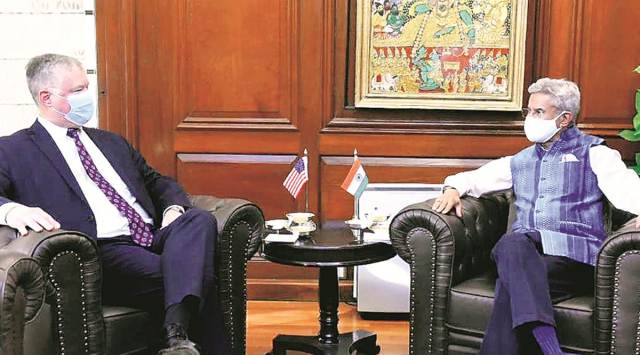Calling China the “elephant in the room”, visiting US Deputy Secretary of State Stephen E. Biegun on Monday said that the Quad is a partnership driven by shared interests, not binding obligations, and is not intended to be an exclusive grouping.
Biegun also made it clear that the security partnerships the United States and its partners explore today do not necessarily need to follow the model of the last century of mutual defence treaties with a heavy in-country presence of US troop.

Speaking at the Ananta Centre India-US Forum in New Delhi, Biegun said, “Any country that seeks a free and open Indo-Pacific, and is willing to take steps to ensure that, should be welcome to work with us.”
Story continues below this ad
On Monday, Biegun met Foreign Secretary Harsh Vardhan Shringla and subsequently External Affairs minister S Jaishankar, among other scheduled meetings in the government during his three-day trip to India. His conversations are expected to set the stage for Indo-US 2+2 ministerial meeting between Jaishankar and Defence Minister Rajnath Singh on the Indian side, and US Secretary of State Michael R Pompeo and Defense Secretary Mark Esper.
Biegun said the US has already begun “increased foreign military sales and intelligence sharing with India. But there is more that we can do, including strengthening India’s ability to defend itself and by promoting interoperability among our militaries through regular exercises and exchanges, common defence platforms, and co-development.
ExplainedSignal to Beijing: India not alone
Five months into India's standoff with Chinese PLA in Ladakh and the Quad meeting in Tokyo, the latest comments by Stephen Biegun on his India visit are a clear message to an aggressive China. New Delhi, too, is taking the step to signal to Beijing that it is not alone. Beigun's visit sets the stage for a possible India-US 2+2 in-person meeting later this month.
“The upcoming 2+2 ministerial meeting between Secretary Pompeo and Minister Jaishankar and their respective defence counterparts will be an excellent opportunity to explore next steps on some of these issues,” he said at the closed-door meeting. “The Quad is a partnership driven by shared interests, not binding obligations, and is not intended to be an exclusive grouping. Any country that seeks a free and open Indo-Pacific and is willing to take steps to ensure that, should be welcome to work with us.”
“Together we stand for a pluralistic vision that will ensure that our countries, and all the region’s diverse countries, can thrive as sovereign and prosperous nations in a free and open Indo-Pacific. One might call this a vision of a Pax Indo-Pacifica, a region at peace, protected and made prosperous in equal measure by those who comprise the Indo-Pacific,” he said.
Story continues below this ad
Biegun said: “As the United States assesses our own interests and how they intersect with India’s, we have seen the conditions emerge for an organic and deeper partnership — not an alliance on the post-war model, but a fundamental alignment along shared security and geopolitical goals, shared interests, and shared values.”
Stressing that the US post-World War II Pacific treaty alliances contributed to security and prosperity in the Indo-Pacific for seven decades, he said, “But I should also be clear that the security partnerships the United States and our partners explore today do not necessarily need to follow the model of the last century of mutual defence treaties with a heavy in-country US troop presence. Today we benefit from forging close links with countries, like India, that share our vision of a free and open Indo-Pacific and that seek to provide for their own defence.
“In this context, the United States certainly benefits from an India that is as strong and prosperous. And our cooperation can come in far more ways than in the past, particularly with the advance of technology, the shifts in global economic influence, and changing geopolitical circumstances.”
Biegun said, “Of course, as we advance in this direction, there is an elephant in the room: China.”
Story continues below this ad
He said that “recent events in the region” reflect that the Indo-US work together in the Quad and in other multilateral groupings are “critical pillars”, as “is formalising our cooperation — bilaterally and with others — in more regular and systematic ways that offer benefits to our nations’ security”.









